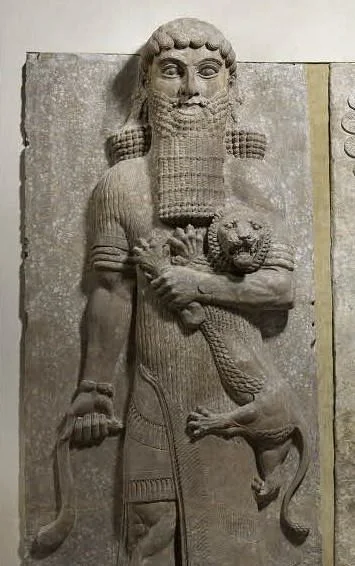Saturday, June 15, 2024
Saturday, May 20, 2023
Commentary: on the Epic of Gilgamesh
Part of the attraction of the Epic of Gilgamesh, at least for me, is that this is mankind's oldest literary work; the tablets containing the story of Gilgamesh were written approximately 4,000 years ago. Despite this, the text has a contemporary quality not necessarily found in other ancient texts. It is the story of a man's journey to self-knowledge and inner peace; of course, this "heroes' journey" is not exceptional in describing the journey, it is the traditional journey from unself-consciousness to being conscious of one's life; in its simplicity, directness, and its archetype of inner discovery, we can relate to Gilgamesh.
In the Epic of Gilgamesh we can see ourselves, but
to do so we might delete cultural referents and concentrate on the man who is
Gilgamesh, a man who is us. We are contemporary people, living at least four
thousand years after Gilgamesh lived or was invented, whether he is an invention, a fictional being,
or an historical character; we can relate to his journey for it is also our
journey, not embellished by belief or gods or being saved by someone else, and
in this Gilgamesh, portrayed in mankind's oldest text, is contemporary. He is relevant at both ends
of linear time -- alpha and omega, beginning and ending, A to Z, the apparent
beginning and the end of the age in which we live -- we can identify
with someone from the beginning of time. Ironic, isn't it? But it speaks to the
enduring authenticity of the Epic of
Gilgamesh.
There is also the story itself, and
what a contemporary story it is as Gilgamesh searches for the meaning of life,
the ultimate meaning, the meaning that explains the purpose of life, that explains the purpose of his life. The
meaning of life is to understand life better, to be a conscious person, to make sense of life, perhaps to even find some peace in life. Gilgamesh is an archetype for the person who
searches for meaning; that's how I read his adventure, his story, his journey.
This is one of the ways in which people today can learn from this epic, it is
thoroughly contemporary even with its inclusion of gods and experiences
impossible for people today to relate to except as literature, myth, and dream
content. But at an archetypal and psychological level Gilgamesh and his story
open a level of understanding of existence that is valuable for a contemporary
audience.
Gilgamesh predates Homer's Odyssey and Iliad which date from 1,000 B.C. There is an oral tradition
that helped preserve Homer's work but this doesn't seem to apply to the Epic of Gilgamesh, it is a written text.
This reminds me of Grimm's fairy tales, collected by the Grimm brothers in the
early half of the 19th Century; but research maintains that the stories collected
by the Grimm brothers originated as far back as 4,000 years B.C. and I have
also read that they are as old as 20,000 years, predating even Gilgamesh. They
are archetypal and ageless, beyond time itself, as are
all myths that work on a psychological level: don't take them literally but as a
way to understand the eternal enigma of human existence.
Gilgamesh seems to have missed out
on an oral tradition as is found in both Homer and the Grimm fairy tales, but
we have a written text for Gilgamesh. We know of the Epic of Gilgamesh only because cuneiform tablets containing the
text of this literary work were discovered in the mid-1800s and later
translated into English, this was fortuitous because even today very few people
can actually read these tablets or speak the ancient language in which they are
written. It is also a synchronistic discovery, Gilgamesh was
discovered just when his story needed to be discovered. But is it possible that
the Epic of Gilgamesh is older than 2,000 BC?
Another point is that the biblical
story of the flood, coming after Gilgamesh was written, is also found in the
Gilgamesh epic; apparently, whoever wrote the Book of Genesis, in which the
flood story is included, knew or had heard of the Gilgamesh version of the
flood. The biblical version of the flood is more or less a direct copy of that
which is found in Gilgamesh. Was the Gilgamesh version of this story
transmitted orally to the authors of the Old Testament?
I am old fashioned, I believe in a didactic aspect to what I read; I like to learn things from what I read, especially things appertaining and contributing to my understanding of life. Whether it is F. Scott Fitzgerald's The Great Gatsby or Melville's Moby Dick, or the Epic of Gilgamesh, I am always aware of content and narrative, symbol and archetype that help me better understand both my own life and the life of others. Never underestimate this transcendent aspect of reading.
Friday, March 10, 2023
My grandfather's shovel
A month ago, when a shovel that had belonged to my grandfather broke, I was shoveling snow on our front walk with it, it led me to remember and write about my grandfather. My grandfather had been captain at Fire Station/Caserne 46 when he retired in the early 1940s and, years later, my mother gave me a shovel that had belonged to him. When the shovel broke I thought I would throw it out. I used to have two of these heavy iron shovels, one had already been lost when our barn burned down around 1985. I wasn't careful with the remaining shovel; I left it outside all year, behind our garden shed, it was only an old shovel; still, it had been special to my mother mainly because they don't make shovels like this anymore, it was a shovel made to last, and it had belonged to her father; "hang on to that shovel" she said.
But now, when the shovel was broken, I remembered Robert Johnson's Balancing Heaven and Earth (1998), a book I had reviewed, and in which Johnson remembers something he thought was junk and had discarded, it was a clock that had woken him for important events in his life. In the review I wrote,
As one would expect, there are many anecdotes in this memoir, always with the effect of returning us to the importance of the inner world. The resolution of life's contradictions lies in becoming more conscious, and this sometimes requires the ritualization of the mundane; Johnson describes how a broken clock that was unceremoniously discarded was later retrieved from the garbage. Alone, he made a ceremony of burying the clock, a ritual during which he remembered with fondness the many events the lock awoke him for, including leaving for Europe, visiting Dr. Jung at his home, and so on.
Thinking of this I retrieved the two parts of the broken shovel and glued them together, it was as though the shovel had never broken, it had been restored and I had the shovel as a souvenir of my grandfather. It was a memento and mementos are limited in number; sixty years after his death I have been revisited by him and reminded of the importance of one of the few things that I have that belonged to my grandfather.
I have a few mementos from my mother and I have this old shovel. But what to do with the shovel? Put it on display? Hang it on the wall? Prop it against the wall? Maybe. But this shovel will be a nuisance if I don't do something with it. And when I am gone the shovel will mean nothing to other people, it will just be an old shovel and one that will break again, if used, and then be discarded. I know why things from the past don't last, why they end up discarded even though they have a personal importance; antiques have some monetary value but most mementos have no value except to the person who values them. There is no reason why anyone will keep this old shovel after I am gone.
Being a literary person and a poet, and a teacher, I see the symbolic value of things. It is that a shovel like this was once used to clean up after a fire, or shovel snow, but while a shovel is used to dig in to the ground, to clean up things, it also has an archetypal value, a psychological value; and this is what we do, we who are archivists of memory, we see the symbolic and meaningful aspect of things pertaining to the psyche; it is one of the things that gives depth to life. The broken shovel reminded me of my grandfather and my relationship with him, it reminded me that he is important to me; his story is unique in our family's history.
As a last resort, maybe I could bury the shovel in my garden, but I am reluctant to do this, for some reason I think it is rather ghoulish; a shovel is not a corpse. It is a shovel that will live on in memory; but always knowing that these mundane things can break, be thrown out, be discarded, and even memories have a certain limited longevity, based on how long we remember. And, one day, everything is forgotten unless it is written down and, even then, everything is temporary.
Tuesday, December 13, 2022
Hortus conclusus, the enclosed garden
 |
| From the street |
 |
| From the street |
 |
| From the street |
When my son, who is a Medievalist, saw the fences around my garden he mentioned "hortus conclusus", the concept of the enclosed garden from the Middle Ages; this garden design has its origin and attribution to the Virgin Mary but gardens are also a part of our spiritual history, beginning with the Garden of Eden and the fall of Man. The hortus conclusus is an archetypal garden, it has that special quality of spiritual authenticity that gives the garden a greater significance, as a place that resonates in both our Christian spirituality and the spirituality of other religions. So, this is no happenstance that I have these walls enclosing the garden; this is a way of finding spirituality, or God, in the physical and material world, and it is the reason I find such happiness in having the garden enclosed with these walls.
And so, the hortus conclusus is a place of peace, and one wants to be there because it is a place of quiet, an entrance to the spiritual, and a place of temenos. All of this is foreign to our contemporary life, but people in the past, especially the Middle Ages, understood the meaning of the enclosed garden.
Thursday, May 24, 2012
Poetry Must be Authentic to Psyche
Friday, September 16, 2011
Saturday, September 10, 2011
Jean Paul Gaultier exhibit at the Montreal Museum of Fine Arts, August 2011 (1)
For some of us, the Jean Paul Gaultier exhibition currently at the Montreal Museum of Fine Arts is of only peripheral interest. Gaultier doesn’t need my review of his work, he’s wealthy and well known, but I also wonder if this work belongs in a museum? Probably not. However, it is a lot cheaper for a museum to present haute couture from France than traditional “art.” I am not too sure why this exhibition was presented in the summer months as it might have little appeal to tourists who would correctly think they would be seeing "art" in a museum, not a fashion show from France. And, at first, it has the aura of the worst of French society and the fashion industry, exclusivity, insularity, smugness, self-righteousness, and self-satisfaction.
It was not before I had seen half of the show that the clue into this exhibition of Gaultier’s work dawned on me. There were the creepy talking mannequins, the pointy bras popularized by Madonna, and the kind of costumes you see in fashion magazines that are not for actual wearing but are the folly and pretense of fashion designers like Gaultier. Gaultier is well known and lives in an exclusive world, one to which most of us don't have access.
But there is a clue to Gaultier's exhibition. It is that Gaultier has done what all great artists try to do, he has perceived the zeitgeist, he knows what will be popular before the public knows what they are want, and he explores the collective psyche of French society. In this exhibition, Gaultier has opened the collective unconscious and manifested it in his designs. This is not to say that Gaultier is a “great artist,” but only to state that he has done something remarkable, something that is of interest. These items of clothing express the collective unconscious of the French nation, each is an expression of some archetypal aspect of the French psyche.
Gaultier’s exhibition is all about the psychic content of French consciousness and it is an expression of archetypes. The exhibition disturbs some of us because psychic content can be disturbing. And what is it that Gaultier pulls up into consciousness? It is about glamour, extroversion, colour, pretence, and appearance without depth. But it is also about fun, costume, and wearing our psychological complexes in public.
Gaultier’s show is a carnival of appearance, it shows a life of great variety and imagination, it is a celebration of life, and a celebration of superficial folly signifying very little to the average viewer. It is not my world but I can appreciate what Gaultier is doing because if you compare Gaultier’s vision to a possible exhibition of what comprises the American psyche--the growing spiritual emptiness of American society, the lack of culture in much of America, America as the military police of multi-national corporations, and of all the other stereotypes that have at least an essence of truth to them--then Gaultier's vision has a significance that may have been missed. His vision is, at the least, the expression of psychic content--the collective unconscious, archetypes, dreams--and it is both fascinating and an affirmation of life.
Friday, June 24, 2011
From Maud Bodkin
When a great poet uses the stories that have taken shape in the fantasy of the community, it is not his individual sensibility alone that he objectifies. Responding with unusual sensitiveness to the words and images which already express the emotional experience of the community, the poet arranges these so as to utilize to the full their evocative power. Thus he attains for himself vision and possession of the experience engendered between his own soul and the life around him, and communicates that experience at once individual and collective, to others, so far as they can respond adequately to the words and images he uses.
We see, then, why, if we wish to contemplate the emotional patterns hidden in our individual lives, we may study them in the mirror of our spontaneous actions, so far as we can recall them, or in dreams and in the flow of waking fantasy; but if we would contemplate the archetypal patterns that we have in common with men of past generations, we do well to study them in the experience communicated by the great poetry that has continued to stir emotional response from age to age.
Maud Bodkin, Archetypal Patterns in Poetry: psychological studies of imagination; Vintage Books, 1958, pages 7-8. First published in 1934
Sunday, January 9, 2011
Archetypal Patterns in Poetry
.JPG) |
| October 2012 |
In an article, “On the relation of analytical psychology to poetic art,” Dr. C.G. Jung has set forth an hypothesis in regard to the psychological significance of poetry. The special emotional significance possessed by certain poems—a significance going beyond any definite meaning conveyed—he attributes to the stirring in the reader’s mind, within or beneath his conscious response, of unconscious forces which he terms “primordial images,” or archetypes. These archetypes he describes as “psychic residua of numberless experiences of the same type,” experiences which have happened not to the individual but to his ancestors, and of which the results are inherited in the structure of the brain, a priori determinants of individual experience.
From Archetypal Patterns in Poetry: Psychological studies in imagination, by Maud Bodkin, Vintage Books, New York, 1958; first published in 1934
Saturday, September 4, 2010
Thursday, September 2, 2010
Tuesday, August 31, 2010
Sunday, August 29, 2010
Friday, August 27, 2010
Wednesday, August 25, 2010
Monday, August 23, 2010
The Making of Collages (2)
This begins a series of collages--for the next two weeks--made in the winter and spring of 2010. Each collage became, for me, a point of meditation, an insight into the post-modern age.
Each collage is a visual cut-up. The narrative running through our minds of how the world is constructed, how it works, is ended by tearing it into pieces. The random re-organization of these pieces gives us a new narrative, a new insight into how things work.
A longer introduction to The Making of Collages can be found in the posting of last June 28th.
















































